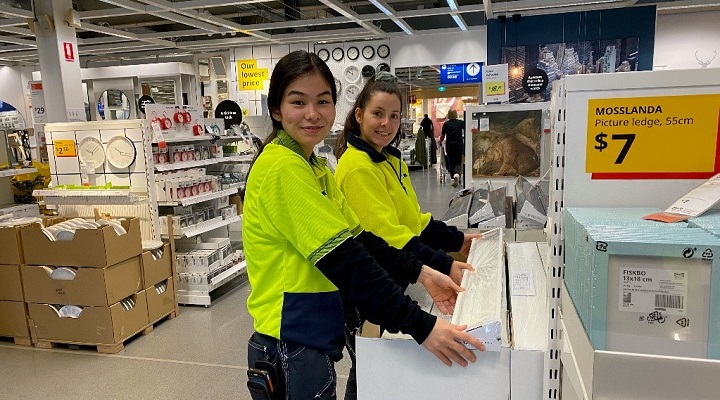Language barriers, lack of support and stereotypes are just some of the challenges refugees face when trying to find work in a new country. That’s why Ikea launched the Skills for Employment program, which not only teaches participants new skills, but also provides them with a reference for future employment. So far, nearly 600 refugees have taken part in the program in Ikea stores across 20 countries. The retailer is targeting 2500 refugees by the end of 2022. Off the back of World Refu
d Refugee Day on June 20, we spoke to Alice Young, head of diversity and inclusion at Ikea Australia, about the program and why more businesses should consider hiring refugees.
Inside Retail: Why did Ikea decide to launch this program?
Alice Young: Ikea is a humanistic and values-driven company, and we continue to play an active role in the communities we operate in. Refugee inclusion programs are a key part of our community engagement efforts. The Ikea Skills for Employment program was launched to help refugees overcome common barriers they may face when seeking employment in Australia, including difficulty getting qualifications recognised, a lack of local networks and local language capability. The paid work placement runs for two months and provides participants with an introduction to the Australian workplace, Ikea ways of working, skills training, English language confidence, and a reference for future employment.
We commissioned a study with 1000+ Australians which found one in two Australians believe businesses could be doing more to support refugee integration into the workforce. We see refugee support as not only a social obligation, but also an opportunity to create a diverse work environment which is better for business.
IR: Why should a business hire people with a refugee background and what is the benefit to them?
AY: We know that refugees bring a high level of motivation and willingness to work in Australia, and have a wide range of skills, qualifications and experience. They just need to be given the opportunity to unlock this potential. We’ve also found the program is mutually enriching for the participants, providing an understanding of Australian workplaces, self confidence in applying for work in Australia and also for existing co-workers who learn how to buddy and mentor refugees and about other members of their community. Refugees are a valuable addition to business and society when provided with the opportunity to integrate through working, and we hope to inspire other businesses to follow in our footsteps.
Supporting the integration of refugees into the workplace has business benefits too, including the establishment of a diverse work environment, which leads to a better understanding of our customers, higher co-worker engagement as there is pride and trust for the company purpose, and as a business we are accessing a different talent pool of highly-motivated talent.
IR: If this is something businesses want to do, where should they start and what are some of the do’s and don’ts?
AY: A good starting point is to research what’s possible and what other organisations are already doing. Tent Partnership for Refugees is a great place to start. Founded by Hamdi Ulukaya, it’s a network of businesses committed to supporting refugees by improving lives and livelihoods. We can highly recommend their Australian Employers Guide to Hiring Refugees.
Businesses may also seek an experienced partner to support their focus – Ikea works with Community Corporate, an award-winning social enterprise. Humans Like Us supports a network of Australia-based employers all interested in refugee integration, enablement and employment. UNHCR, Refugee Council of Australia, and state-based asylum seeker centres are also great avenues for businesses to explore and seek further information from and potentially partner with support.
IR: What have been some of the most interesting lessons you’ve learnt since hiring people with a refugee background at Ikea?
AY: One of the key learnings we’ve had is that refugee employment is a lot easier than some companies may think. Refugees bring a strong willingness and motivation to work and bring valuable and varied skills and qualifications.
Our Skills for Employment program has also provided learning and development opportunities for our existing co-workers as they mentor programme participants and has led to a better understanding of more of our customers.
IR: What are some of the stereotypes that people have around refugees and hiring them?
AY: Common stereotypes or perceptions towards refugees have contributed to many of the barriers refugees face when trying to join the Australian workforce [as well as] difficulties with their qualifications being recognised, a lack of local networks, and local language capability.
Refugees bring valuable and diverse skills, experience and capabilities, and when given the opportunity, refugees can reach their full potential in their new home and make a valuable contribution to their local community and the economy. At Ikea we believe “everyone is talented” and we want to challenge stereotypes and change the narrative around refugees.

